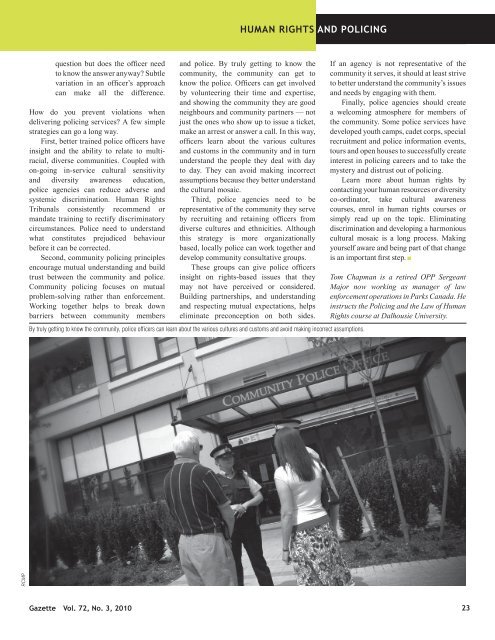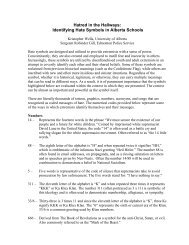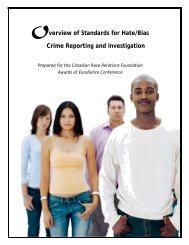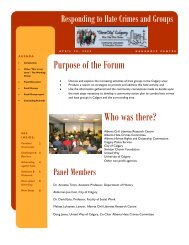huMAN RiGhTShuMANAND POliCiNGRiGhTS AND POliCiNGDo you discriminate?Training, community involvement great tools for preventing biasby Tom ChapmanDalhousie universityDo you discriminate? Do your prejudicesshow in your work? Most police officers donot consider their actions or behaviours asdiscriminatory, but they may be surprisedto learn that they are unintentionally biasedin their day-to-day duties. Subtle <strong>and</strong> evenovert discrimination can manifest in theway a police supervisor treats employeesor in the manner officers interact withthe communities they serve. Often it isunperceived bias that is to blame.<strong>Human</strong> <strong>Rights</strong> legislation providesfundamental protection to everyone inCanada for specified activities based uponindividual or group characteristics. Thefirst human rights legislation came intoeffect in the 1960s. Ensuring these rightsare protected <strong>and</strong> honoured is a continuallyevolving process.Consider the transformation that tookplace between 1960 <strong>and</strong> 2010 in how policeofficers themselves acquired rights in theirown employment. Not so long ago, a personhad to be of a specific height <strong>and</strong> weight tobecome a police officer, <strong>and</strong> women were juststarting to be recruited yet required to resign ifthey became pregnant. The entrenchment <strong>and</strong>advancement of human rights has changed thisso that we now enjoy a more equitable workenvironment. Greater latitude in the areasof maternity <strong>and</strong> parental leave, recruitmentst<strong>and</strong>ards, varied duties for injured or disabledofficers <strong>and</strong> uniform adjustments are nowafforded to accommodate gender, culture,religion <strong>and</strong> other protected grounds thathuman rights legislation grants us.With the advent <strong>and</strong> widespread practiceof community policing principles combinedwith human rights <strong>and</strong> constitutionallegislation, can discrimination still bepossible? Unfortunately, the answer is yes, butit can be prevented.Although some policing actions may bedeliberately biased, many simply originatefrom a lack of awareness <strong>and</strong> knowledgeof fundamental human rights <strong>and</strong>their implications.What do police officers need toknow? <strong>Human</strong> rights legislation providesprotection in the areas of accommodation,employment <strong>and</strong> goods <strong>and</strong> services forprotected grounds such as race, colour,religion, gender, age, marital <strong>and</strong> familystatus, sexual orientation <strong>and</strong> disability.Just as officers enjoy these rights inemployment, the expectation is that theservice they provide to the public will bedelivered in an equitable manner upholdingthe same protected rights.As with any law, police officers need tostay informed <strong>and</strong> know what is requiredby these statutes. Each province <strong>and</strong>territory, as well as the federal government,has enacted human rights legislation <strong>and</strong>the courts uphold these protections asquasi-constitutional, <strong>and</strong> interpret themliberally. All Acts are similar, yet someminor variations create the need for eachto be reviewed for clarity. For example,the Ontario <strong>Human</strong> <strong>Rights</strong> Act specificallynames breastfeeding as a gender-basedactivity whereas the other Acts do notspecially list this protection.intentional or not, it’sstill discriminationIn lay terms, discrimination is anydifferential treatment of a person or groupbased on individual characteristics thatexcludes, denies or prevents that personor group from participating or enjoyingthe same rights, freedoms, liberties oropportunities available to others. Intent isnot required to be proven. It is the effect ofthe treatment that is considered crucial.Discrimination may be direct (intentional)or adverse or systemic where no intentionis involved. A genuine rule or st<strong>and</strong>ard mayadversely affect some people such as forcingshift workers to work weekends contraryto religious beliefs. Likewise, height <strong>and</strong>weight requirements may unfairly eliminatecertain classes of people. Systemic issuesoccur from long-st<strong>and</strong>ing prejudices orstereotypes. The old belief that women donot have the body size or strength for policework or firefighting comes to mind.Although legislation focuses onremedying discriminatory situations <strong>and</strong>works to resolve, educate <strong>and</strong> preventdiscrimination rather than applyingpenalties, there are consequences for thosefound contravening these protections. Thereare several avenues to provide victims withrelief from discriminatory situations. Theseinclude m<strong>and</strong>ating educational sessions tothe person who discriminated, changing apolicy or, in some cases, providing monetarycompensation. Civil suits are also possible.All Police Acts include discriminatorybehaviour as discreditable conduct thuscreating possible disciplinary measures.A couple of examples will show howeasily misunderst<strong>and</strong>ings can lead todiscrimination.• Police stop a man in an area wherebreak <strong>and</strong> enters are frequent. Hespeaks very little <strong>and</strong> does notopenly respond to questioning.Police arrest him, but later he isreleased unconditionally. It turnsout that he is a rabbi who wasobserving a custom of silenceon the Sabbath, but the arrestingofficer was not familiar with thiscustom. The arresting officer didnot recognize the man’s right tosilence in observance of a religiousobligation. By being aware of thepossibility of a this man’s actionsresulting from a cultural or religiousbasis may have led the officer to adifferent course of action.• A person of colour is stopped forspeeding <strong>and</strong> police ask him ifhe is Canadian. This seeminglyinnocent question does notrespect human rights. What doesnationality or citizenship haveto do with a traffic violationother than possibly indicate anadverse bias towards a person ofcolour? Would the same officerask a Caucasian person the samequestion? Obtaining the person’sdriver’s licence can answer that22<strong>Gazette</strong> Vol. 72, No. 3, 2010
huMAN RiGhTS AND POliCiNG<strong>RCMP</strong> COVERquestion but does the officer needto know the answer anyway? Subtlevariation in an officer’s approachcan make all the difference.How do you prevent violations whendelivering policing services? A few simplestrategies can go a long way.First, better trained police officers haveinsight <strong>and</strong> the ability to relate to multiracial,diverse communities. Coupled withon-going in-service cultural sensitivity<strong>and</strong> diversity awareness education,police agencies can reduce adverse <strong>and</strong>systemic discrimination. <strong>Human</strong> <strong>Rights</strong>Tribunals consistently recommend orm<strong>and</strong>ate training to rectify discriminatorycircumstances. Police need to underst<strong>and</strong>what constitutes prejudiced behaviourbefore it can be corrected.Second, community policing principlesencourage mutual underst<strong>and</strong>ing <strong>and</strong> buildtrust between the community <strong>and</strong> police.Community policing focuses on mutualproblem-solving rather than enforcement.Working together helps to break downbarriers between community members<strong>and</strong> police. By truly getting to know thecommunity, the community can get toknow the police. Officers can get involvedby volunteering their time <strong>and</strong> expertise,<strong>and</strong> showing the community they are goodneighbours <strong>and</strong> community partners — notjust the ones who show up to issue a ticket,make an arrest or answer a call. In this way,officers learn about the various cultures<strong>and</strong> customs in the community <strong>and</strong> in turnunderst<strong>and</strong> the people they deal with dayto day. They can avoid making incorrectassumptions because they better underst<strong>and</strong>the cultural mosaic.Third, police agencies need to berepresentative of the community they serveby recruiting <strong>and</strong> retaining officers fromdiverse cultures <strong>and</strong> ethnicities. Althoughthis strategy is more organizationallybased, locally police can work together <strong>and</strong>develop community consultative groups.These groups can give police officersinsight on rights-based issues that theymay not have perceived or considered.Building partnerships, <strong>and</strong> underst<strong>and</strong>ing<strong>and</strong> respecting mutual expectations, helpseliminate preconception on both sides.By truly getting to know the community, police officers can learn about the various cultures <strong>and</strong> customs <strong>and</strong> avoid making incorrect assumptions.If an agency is not representative of thecommunity it serves, it should at least striveto better underst<strong>and</strong> the community’s issues<strong>and</strong> needs by engaging with them.Finally, police agencies should createa welcoming atmosphere for members ofthe community. Some police services havedeveloped youth camps, cadet corps, specialrecruitment <strong>and</strong> police information events,tours <strong>and</strong> open houses to successfully createinterest in policing careers <strong>and</strong> to take themystery <strong>and</strong> distrust out of policing.Learn more about human rights bycontacting your human resources or diversityco-ordinator, take cultural awarenesscourses, enrol in human rights courses orsimply read up on the topic. Eliminatingdiscrimination <strong>and</strong> developing a harmoniouscultural mosaic is a long process. Makingyourself aware <strong>and</strong> being part of that changeis an important first step. ▪Tom Chapman is a retired OPP SergeantMajor now working as manager of lawenforcement operations in Parks Canada. Heinstructs the <strong>Policing</strong> <strong>and</strong> the Law of <strong>Human</strong><strong>Rights</strong> course at Dalhousie University.<strong>RCMP</strong><strong>Gazette</strong> Vol. 72, No. 3, 2010 23







